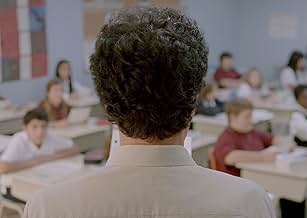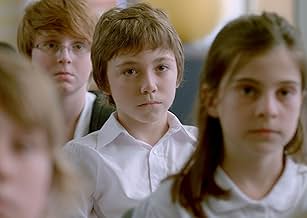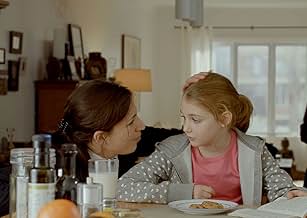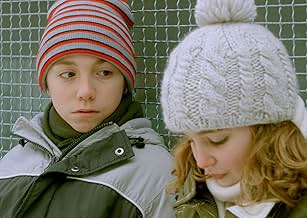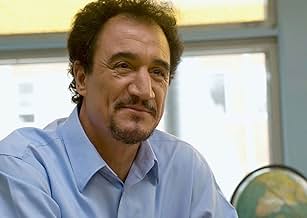At a Montréal public grade school, an Algerian immigrant is hired to replace a popular teacher who committed suicide in her classroom. While helping his students deal with their grief, his o... Read allAt a Montréal public grade school, an Algerian immigrant is hired to replace a popular teacher who committed suicide in her classroom. While helping his students deal with their grief, his own recent loss is revealed.At a Montréal public grade school, an Algerian immigrant is hired to replace a popular teacher who committed suicide in her classroom. While helping his students deal with their grief, his own recent loss is revealed.
- Nominated for 1 Oscar
- 30 wins & 14 nominations total
Mohamed Fellag
- Bachir Lazhar
- (as Fellag)
Nicole-Sylvie Lagarde
- Psychologue
- (as Nico Lagarde)
- Director
- Writers
- All cast & crew
- Production, box office & more at IMDbPro
Storyline
Did you know
- TriviaBased on the stage play Bashir Lazhar by Evelyne de la Chenelière. The playwright appears in the movie as Alice's mother.
- ConnectionsFeatured in The 84th Annual Academy Awards (2012)
Featured review
This absorbing film, set in Montreal, ties together two tragedies and by such a linkage shows our capacity for human understanding and emotional empathy. While that may sound excessively depressing to some readers, I found a semblance of hope in this film as the characters, both young and old, try to move on with their lives and cope as best they can, and while the trauma may be a permanent part of their psyches, their seeming resilience conveys a kind of worldly maturity and acceptance.
The film opens with two school children discovering a favorite, but troubled, teacher who has hung herself in her classroom while her students are at recess. Psychologists are brought in to help the students cope with the emotional intensity of such a tragedy, and then later a Mr. Bachir Lazhar, an Algerian immigrant, presents himself to the principal as a suitable replacement for the suicide victim's class telling her how he's followed the school's trauma in the newspapers and he's available to help. Does he need the work (we find out his legal status is uncertain and he's in danger of being deported) or is some unconscious empathetic force driving him toward working with these students since he seems to understand their pain? The school authorities prefer to move on from the tragic event while Mr. Lazhar can sense after a number of months that some of his students are dwelling on their former teacher's act and her reasons for doing so; he encourages them to talk in class about their feelings and for this he is rebuked. We eventually discover the horrific tragedy surrounding his own family and why he's fled to Canada, and from this we can understand and appreciate his empathy for his students and his understanding of their emotional plight ("why did she do it in her own classroom during school?"). The film has many touching moments as this strange Algerian immigrant explains the "unexplainable" to his students and they in turn seem to provide him with an emotional outlet, and a purpose, to counter his own suffering.
Some reviewers have questioned the film's seeming lack of total emotional resolution, but life can be open-ended. Will these children completely heal (as much as they can) and will Mr. Lazhar's half-year encounter with these kindred souls give him the emotional basis for sustaining a meaningful life in a foreign environment? We don't really know, but some of the signs that the film depicts seem to be favorable. A very worthy film from Canada!
The film opens with two school children discovering a favorite, but troubled, teacher who has hung herself in her classroom while her students are at recess. Psychologists are brought in to help the students cope with the emotional intensity of such a tragedy, and then later a Mr. Bachir Lazhar, an Algerian immigrant, presents himself to the principal as a suitable replacement for the suicide victim's class telling her how he's followed the school's trauma in the newspapers and he's available to help. Does he need the work (we find out his legal status is uncertain and he's in danger of being deported) or is some unconscious empathetic force driving him toward working with these students since he seems to understand their pain? The school authorities prefer to move on from the tragic event while Mr. Lazhar can sense after a number of months that some of his students are dwelling on their former teacher's act and her reasons for doing so; he encourages them to talk in class about their feelings and for this he is rebuked. We eventually discover the horrific tragedy surrounding his own family and why he's fled to Canada, and from this we can understand and appreciate his empathy for his students and his understanding of their emotional plight ("why did she do it in her own classroom during school?"). The film has many touching moments as this strange Algerian immigrant explains the "unexplainable" to his students and they in turn seem to provide him with an emotional outlet, and a purpose, to counter his own suffering.
Some reviewers have questioned the film's seeming lack of total emotional resolution, but life can be open-ended. Will these children completely heal (as much as they can) and will Mr. Lazhar's half-year encounter with these kindred souls give him the emotional basis for sustaining a meaningful life in a foreign environment? We don't really know, but some of the signs that the film depicts seem to be favorable. A very worthy film from Canada!
- How long is Monsieur Lazhar?Powered by Alexa
Details
- Release date
- Country of origin
- Official site
- Languages
- Also known as
- Quý Ông Lazhar
- Filming locations
- Production companies
- See more company credits at IMDbPro
Box office
- Gross US & Canada
- $2,009,517
- Opening weekend US & Canada
- $112,190
- Apr 15, 2012
- Gross worldwide
- $9,074,711
- Runtime1 hour 35 minutes
- Color
- Sound mix
- Aspect ratio
- 2.35 : 1
Contribute to this page
Suggest an edit or add missing content



